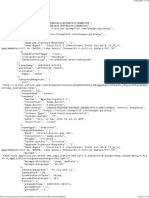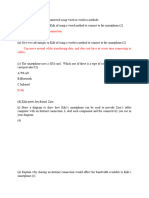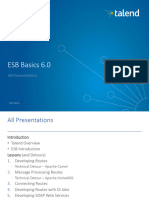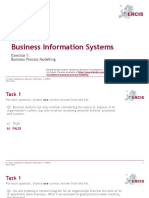RV College of Engineering, Bengaluru– 59
Department of Computer Science and Engineering
DATABASEMANAGEMENTSYSTEMS(CD252IA)
Event Management System
USN Name
1RV22CS121 Mustqeem Sannakki
1RV22CS130 Ningaraj P Totagi
1RV22CS136 Pavankumar R
Software Requirements Specification (SRS)
1. Introduction
The Event Management System (EMS) is a modern platform that simplifies event planning and
management through automation and intelligent analytics. Using machine learning, the system
recommends venues and organizers based on user inputs, ratings, feedback, and cost per head,
ensuring an efficient and personalized event planning experience. The system centralizes event
tasks, promotes cost optimization, and enhances decision-making with advanced
recommendations.
1.1 Purpose
The Event Management System streamlines the event planning process by offering:
• AI-powered Recommendations: Intelligent suggestions for venues and organizers.
• Cost Efficiency: Optimized suggestions based on cost-per-head analysis.
• Centralized Event Management: A single platform to manage all event-related tasks
efficiently.
• User-Centric Personalization: Tailored suggestions based on historical feedback,
ratings, and user behavior.
The EMS simplifies the complexities of event management for individuals, businesses, and
event organizers, helping them plan successful events effortlessly.
1.2 Scope
The Event Management System will provide the following functionalities:
• AI-driven recommendations for venues and organizers.
• Feedback and rating-based personalization.
• Cost optimization features to ensure budget-friendly planning.
• A centralized dashboard for event tracking and updates.
� • Real-time analytics for venue performance and user interactions.
• Integration with structured (RDBMS) and unstructured (NoSQL) data for scalability
and dynamic decision-making.
1.3 Definitions, Acronyms, and Abbreviations
• AI: Artificial Intelligence
• RDBMS: Relational Database Management System
• NoSQL: Non-Structured Query Language
• EMS: Event Management System
• API: Application Programming Interface
1.4 Overview
This document outlines the functional requirements, non-functional requirements, system
features, and the hybrid database integration necessary for the development of the Event
Management System.
2. Overall Description
2.1 Product Perspective
The EMS integrates AI and machine learning algorithms to overcome the limitations of
traditional event planning methods. By combining user feedback, ratings, and cost analysis, the
system offers personalized recommendations for venues and organizers. The platform
consolidates event-related workflows into a single, user-friendly dashboard.
2.2 Product Functions
• User Management: User registration, login, and profile management.
• Event Management: Creation and scheduling of events.
• Venue Management: Recommendations and feedback on venues.
• Organizer Management: Suggestions for suitable organizers based on performance
metrics.
• Feedback Integration: Collection of ratings and reviews to improve recommendations.
• Cost Analysis: Calculation of cost-per-head to offer budget-friendly options.
• Dashboard: A centralized interface for event planning, updates, and analytics.
2.3 User Classes and Characteristics
• Event Organizers: Professionals who organize events and manage venues.
• Individuals: Users planning personal events such as weddings, parties, or seminars.
• Businesses: Companies hosting conferences, product launches, or corporate events.
�2.4 Operating Environment
• The system will operate on web browsers and mobile devices.
• Requires stable internet connectivity for real-time updates and AI-powered
recommendations.
2.5 Design and Implementation Constraints
• RDBMS (MySQL) for structured data such as user profiles, event details, and feedback.
• NoSQL (MongoDB) for unstructured data like real-time analytics and ML models.
• APIs for communication between RDBMS and NoSQL databases.
2.6 User Documentation
The following documentation will be provided:
• User Manuals
• Online Help Guides
• FAQs for troubleshooting
2.7 Assumptions and Dependencies
• Users have basic knowledge of event planning.
• Reliable internet connectivity is required for optimal performance.
• Integration with third-party APIs for real-time data analytics.
3. Specific Requirements
3.1 Functional Requirements
• User Registration and Authentication: Secure login and user management.
• Event Creation and Management: Users can create, edit, and delete events.
• Venue and Organizer Recommendations: AI algorithms suggest options based on
ratings, feedback, and cost analysis.
• Feedback Collection: Users can submit ratings and reviews after events.
• Cost Analysis: Calculation of cost-per-head for budget optimization.
• Dashboard: Centralized view for tracking event progress, updates, and analytics.
• Notifications: Real-time alerts for updates or reminders.
3.2 Non-Functional Requirements
• Performance: The system must support multiple concurrent users without performance
degradation.
� • Scalability: Capable of handling growing user data and increasing event volumes.
• Security: Implement encryption for user data and secure login protocols.
• Usability: Provide an intuitive and user-friendly interface.
• Availability: Ensure 99.9% uptime for seamless user experience.
3.3 External Interface Requirements
• User Interfaces: Responsive web and mobile interfaces.
• Hardware Interfaces: Compatibility with standard computing devices.
• Software Interfaces: Integration with external APIs for real-time updates.
• Communication Interfaces: HTTP/HTTPS protocols for secure communication.
3.4 System Features
• AI-Powered Recommendations: Personalized venue and organizer suggestions.
• Real-Time Analytics: Updates on event metrics and user behavior.
• Feedback Integration: Dynamic updates to improve recommendation accuracy.
• Cost Optimization: Budget-friendly options based on cost-per-head calculations.
4. RDBMS and NoSQL Integration
4.1 Relational Database Design
• Entities: Users, Events, Venues, Organizers, Payments, and Feedback.
• Relationships:
o Users ➞ Events
o Events ➞ Venues
o Events ➞ Organizers
o Users ➞ Feedback
4.2 NoSQL Implementation
• Storage of unstructured data like real-time user behavior, analytics, and ML training
datasets.
4.3 Middleware Integration
• APIs will enable synchronization between MySQL (RDBMS) and MongoDB
(NoSQL).
• Real-time updates fetched dynamically for enhanced performance.
�5. Societal Concern
5.1 Efficiency in Event Planning
The EMS streamlines event planning by automating workflows, saving users time and effort.
5.2 Cost Optimization
The system ensures budget-friendly event suggestions by analyzing cost-per-head, helping
users plan within their financial limits.
5.3 Sustainability
By digitizing event workflows, the EMS reduces paper-based processes, contributing to
environmental conservation.
5.4 Accessibility
The platform is designed for users from diverse backgrounds, including individuals,
businesses, and professional event organizers.
5.5 Continuous Improvement
The system incorporates user feedback to improve recommendations and enhance the overall
user experience.
5.6 Informed Decision-Making
By providing real-time analytics and AI-powered insights, users can make well-informed
decisions for successful event planning.
6. Conclusion
The Event Management System modernizes event planning with AI-powered
recommendations, real-time analytics, and user feedback integration. By leveraging RDBMS
and NoSQL databases, the EMS ensures efficient data management and scalability. The system
promotes cost-effective, sustainable, and user-friendly event planning for individuals,
businesses, and professional organizers.
























































































